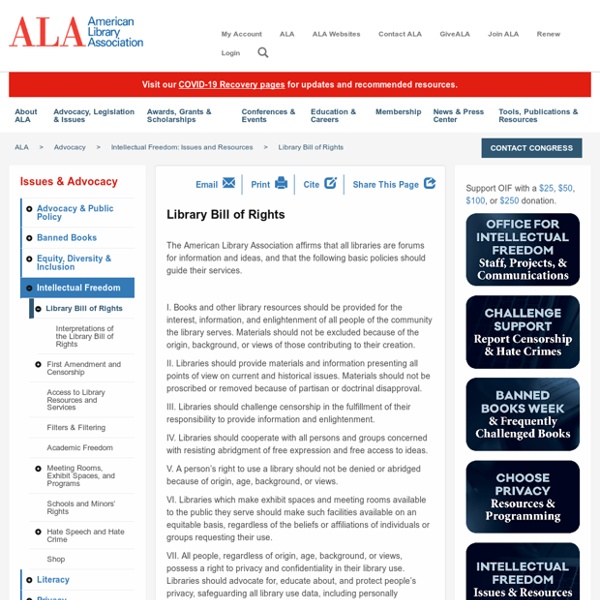Advocacy, Legislation & Issues
Our founders recognized that public schools are a vital institution of American democracy. But education, they also knew, involved more than reading, writing, and arithmetic. Education in a democratic society requires developing citizens who can adapt to changing times, make decisions about social issues, and effectively judge the performance of public officials. In fulfilling their responsibilities, public schools must not only provide knowledge of many subject areas and essential skills, but must also educate students on core American values such as fairness, equality, justice, respect for others, and the right to dissent.
The Freedom to Read - ALA
The freedom to read is essential to our democracy. It is continuously under attack. Private groups and public authorities in various parts of the country are working to remove or limit access to reading materials, to censor content in schools, to label "controversial" views, to distribute lists of "objectionable" books or authors, and to purge libraries.
Family Educational Rights and Privacy Act (FERPA)
The Family Educational Rights and Privacy Act (FERPA) (20 U.S.C. § 1232g; 34 CFR Part 99) is a Federal law that protects the privacy of student education records. The law applies to all schools that receive funds under an applicable program of the U.S. Department of Education.
Universal Declaration of Human Rights - UN
Preamble Whereas recognition of the inherent dignity and of the equal and inalienable rights of all members of the human family is the foundation of freedom, justice and peace in the world, Whereas disregard and contempt for human rights have resulted in barbarous acts which have outraged the conscience of mankind, and the advent of a world in which human beings shall enjoy freedom of speech and belief and freedom from fear and want has been proclaimed as the highest aspiration of the common people,
School Libraries Transform Learning
This digital magazine produced by AASL in partnership with American Libraries, is designed to be shared with parents, colleagues, administration, and policymakers. Available electronically or as a PDF download, this tool can open the door to discussions on the multiple ways school libraries transform learning. Articles
The First Amendment in Schools - NCAC
The First Amendment in Schools How does the First Amendment protect students and teachers in schools? NCAC presents the following collection of materials on the topic of censorship in schools for the use of students, educators, and parents everywhere. This information is not intended as legal advice. If you are embroiled in a censorship controversy, we hope you will consult the resources below for guidance — if you need additional assistance, please contact us. NOTE: Guide for Student Protesters available here
School Librarians as Learning Leaders
2016-2017 AASL president Audrey Church’s presidential initiative focused on furthering administrators’ understanding of the key role that strong school libraries and certified school librarians play in student learning. Members of the Presidential Initiative Task Force curated selected quality resources that demonstrate the important instructional role of librarians in 21st century schools. Please utilize these products created by the Task Force to inform principals and other stakeholders that school librarians are learning leaders. June 2017 AASL Advocacy & Legislation Coalition Call ArchiveAudrey and Presidential Initiative Task Force Members Deb Levitov, Michelle Folk, and Priscille Dando introduce the initiative and resources. #SchoolLibrariansTransformStudentLearning #AdvocacyBeginsWithEachOfUs
Intellectual Freedom and Censorship Q & A - ALA
What is Intellectual Freedom? | Why is Intellectual Freedom Important? | What is Censorship?How Does Censorship Happen? | Who Attempts Censorship?
Every Student Succeeds Act (ESSA)
en Español Update: ESSA Consolidated State Plans A New Education Law The Every Student Succeeds Act (ESSA) was signed by President Obama on December 10, 2015, and represents good news for our nation’s schools. This bipartisan measure reauthorizes the 50-year-old Elementary and Secondary Education Act (ESEA), the nation’s national education law and longstanding commitment to equal opportunity for all students.
Children's Internet Protection Act (CIPA)
The Children's Internet Protection Act (CIPA) was enacted by Congress in 2000 to address concerns about children's access to obscene or harmful content over the Internet. CIPA imposes certain requirements on schools or libraries that receive discounts for Internet access or internal connections through the E-rate program – a program that makes certain communications services and products more affordable for eligible schools and libraries. In early 2001, the FCC issued rules implementing CIPA and provided updates to those rules in 2011.
Advocacy, Legislation & Issues
Copyright tools can help libraries and others to be more comfortable with their work to interpret the limitations and exceptions to the exclusive rights granted to the copyright holder under U.S. Copyright law. By exercising these valuable exceptions, we strengthen copyright’s primary purpose "to promote the progress of science and useful arts." Over the past several years, ALA has developed tools to educate libraries, librarians, and others about copyright.



